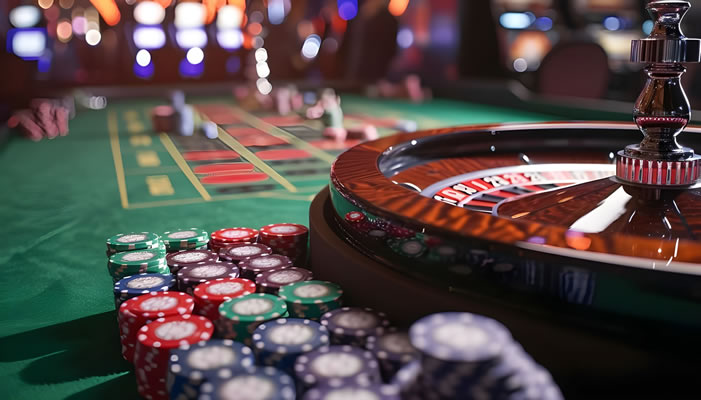The allure of the jackpot is incredibly powerful that individuals across different backgrounds are drawn to it. A strong allure that is hard to resist comes from the chance of winning a sizable quantity of money through casino games, playing lotteries, or playing games of chance. For countless individuals worldwide, the dream of becoming wealthy and financially independent in an instant is an alluring one. Several mental triggers play a role in the jackpot's attraction.
Key Takeaways
- Why jackpots captivate us: The thrill of winning big draws people in because of the potential for transformative gains.Dopamine and the jackpot effect: Our brain's reaction to potential rewards, such as winning a jackpot, is driven by the release of dopamine, creating a feeling of pleasure and drive.The role of risk and reward: The attraction to jackpots stems from the combination of risk with the possibility of reward, engaging the brain’s reward circuits.The psychology of hope and optimism: The chance of a big win influences our outlook, fostering a sense of hope and positive expectation for the future.Social and cultural influences: The jackpot’s appeal to us is influenced by societal values, cultural norms, and peer pressure.
The ability to indulge in luxuries without financial concerns and the possibility of becoming financially free is highly appealing to many. The attraction of potentially being able to afford anything, such as luxurious clothing or exotic trips, motivates people to strive for big successes. In addition, a major part of the jackpot's appeal stems from its unexpected nature & uncertainty. The rush can’t easily be replicated the excitement that is felt when imagining a big win with a single lottery ticket purchase or by spinning the wheel for a large payout. The allure of the jackpot also appeals to people's primal need for adventure and excitement.
The possibility of striking it rich offers the promise of a thrilling new life free from the routine of day-to-day living. Lots of individuals are driven to pursue the ultimate jackpot prize because they find great resonance in the idea of taking a chance & possibly coming out on top. The thrill of placing a huge bet or the suspense of waiting for the lottery results are just two examples of the many ways in which jackpots attract us because they represent human nature's need for thrills and adventures. Dopamine's Role in Anticipating Wins. Dopamine plays a major role in our draw to jackpots, which is why jackpots are irresistible.
A neurotransmitter called dopamine is produced in reaction to pleasurable experiences like indulging in delectable food, taking part in enjoyable activities, and yes, hitting a huge win. Dopamine plays a crucial role in the brain's reward system. Dopamine is triggered in our brain in anticipation of a possible reward, like winning the lottery, which makes us feel good and pushes us to seek more rewards. The Dopamine-Propelled Chase of Massive Victories. There’s a powerful drive to seek out big wins by the strong psychological pull that is created when dopamine is released in response to potential gains.
The possibility of winning a massive prize floods the brain with dopamine, which produces an irresistible rush and excitement. This dopamine surge that fuels our craving to take chances in the hopes of landing a big win & pulls us towards jackpots. The dark side of dopamine: the dark side of dopamine. The brain floods dopamine when we anticipate a big win, which can create an extremely addictive feeling of hope and excitement. Gambling addiction often stems from this, which can be explained by dopamine's role in our draw to jackpots. A powerful psychological force that can result in addiction & an inability to resist the allure of big wins is created when dopamine is released in response to big win potential.
Our natural desire for risk and reward is closely tied to the allure of the lottery. The possibility of striking it rich is a high-stakes game that appeals to our deep need for risk and excitement. Our attraction to jackpots is driven by the risk and excitement that comes with going after big victories. Lots of people find great resonance in the concept of risk-taking and possibly earning huge rewards, which pushes them to gamble in the hopes of claiming the grand prize. Humankind’s history as hunter-gatherers may also be used to explain the connection between risk-taking and reward-seeking in our fascination with jackpots.
Risk-taking was essential for survival throughout history because it frequently meant the difference between obtaining essential resources and going without. This behavior became beneficial in obtaining food, shelter, and other necessities, it became hardwired in us to seek out high-reward risks. Our natural desire for risk and reward continues to influence us today, causing us to be drawn to jackpots and encourage us to take chances in the hopes of hitting big.
Risk and reward drive our pull to jackpots, which connects with our need for independence and autonomy. The potential for wealth offers the chance to live life without limits and on one's own terms. The opportunity to take a risk and perhaps landing huge rewards taps into our innate need for independence and personal agency, which motivates us to go for big wins in the quest for financial independence. A huge part of jackpot allure is the optimism and hope that big wins inspire. The chance for a massive win sparks hope for a better future, which fuels our ambition and drives us to go after big wins.
It is difficult to resist the optimism that arises from the thought that one fortunate event has the potential to transform our lives. The potential for great wealth taps into our desire for optimism and hope, pushing us to take risks in the quest for financial security and financial stability. The psychology of optimism and hope also has a significant impact on how we think about going after big victories.

We are energized by hope and we are inspired to keep chasing after large wins despite the odds when we have the possibility of winning the jackpot. This sense of hope and excitement can be highly addictive. We gamble for financial freedom because we have an unyielding optimism that one fortunate break could change our future. The role optimism plays in our mindset when it comes to going for big wins also connects to our deep desire for control of our own lives. Hope powers us forward by the possibility of striking it rich, which inspires us to take risks in the pursuit of financial independence and liberation from money worries. We can't ignore the power of social and cultural pressures on our jackpot fascination.
We are bombarded with messages that reaffirm the appeal of striking it rich, with media portrayals of overnight millionaires to societal norms to achieve financial wealth. Our view of jackpots are shaped by the ubiquitous influence of social and cultural factors, which also feed our addiction to jackpots and encourage us to gamble in the pursuit of money. Social pressure and cultural expectations are just two more examples of how social and cultural factors affect our craving for jackpots. Chasing big wins is regarded as an desirable, glamorous, and exciting pursuit in various social groups.
Individuals might gamble more in an effort to gain validation or validation from others by feeling pressured to match the success of peers or coworkers who have made money through gambling. The human desire for recognition is further evidenced by the societal influences on Homepage our attraction to jackpots. What draws us to jackpots and pushes us to gamble in the hopes of hitting the jackpot is the possibility of becoming wealthy and well-recognized, which can boost our status. The Addictive Nature of Jackpot Pursuits. The dopamine-driven reaction to prospective rewards can create a dangerous cycle that causes individuals to keep gambling in the hopes of hitting it big, often at a huge cost.
The act of chasing losses can result in a harmful pattern that could seriously impact someone's finances and overall happiness. The Dark Side of the Jackpot: Mental Health Effects. Chasing huge wins can take a toll on relationships and mental health in addition to financial losses. People who develop an addiction to gambling frequently struggle with ever-growing debts & money problems, which can create anxiety, depression, and hopeless.
In addition, gambling for jackpots can damage personal relationships, leading to isolation & loneliness. Support and Awareness for Addicts. The dangers of going after large winnings highlight that individuals struggling with addiction need compassion and assistance.
It is imperative that society recognize the risks of gambling and offers assistance to those in danger of addiction. By taking these steps, we can work towards a safer environment and more encouraging for those struggling to resist the lure of the big win. Develop strategies for responsible gambling behavior to allow people to control the emotional impact of jackpot chasing.
Limiting the amount of time and amount of money invested on gambling activities can prevent compulsive habits and reduce the risks in gambling for big wins. For individuals struggling with gambling addictions linked to chasing jackpots, getting help from friends, family, or professional counselors can be hugely beneficial. Individuals can protect themselves from falling into addiction by learning effective coping mechanisms for managing stress and anxiety.
People can discover healthy ways to manage their stress without turning to high-risk gambling activities by exercising regularly, practicing mindfulness, or finding enjoyable hobbies and pastimes. To sum up, individuals of all backgrounds are fascinated by the jackpot because of its irresistible attraction. Our attraction to big wins is driven by numerous mental triggers, ranging from the dopamine response in reaction to possible rewards to our innate desire for risk and reward. However, in order to prevent developing compulsive gambling behavior patterns, individuals need to recognize the dangers involved in jackpot pursuits and adopt healthy habits for managing the emotional effects.
Individuals can still enjoy the thrill of jackpots without succumbing to addiction by comprehending the psychology underlying our attraction to jackpots & cultivating responsible, responsible gambling behaviors.

FAQs
What is the psychology behind the attraction to winning big jackpots?
Our interest in large jackpots stems from the brain's reward system. When we think about winning big, our brains produce dopamine, a neurotransmitter associated with pleasure and reward-seeking. This surge of dopamine creates a feeling of excitement and creates hope, which can be highly addictive.
What keeps people playing after they lose?
People continue to play for jackpots even after experiencing losses due to the effect of near-miss events. When individuals come close to winning but ultimately fall short, it creates a dopamine boost just like that of an actual win. This near-miss experience fuels hope and encourage continued play, despite previous losses.
What role does social influence play in the attraction to winning big jackpots?
Social factors are key in the attraction to winning big jackpots. The visibility of jackpot winners in the public eye and within social circles can create a sense of social proof, leading individuals to think winning is possible and desirable. Additionally, the joy and celebration around big wins can motivate others to start gambling.
What are the downsides of craving jackpots?
The attraction to winning big jackpots can lead to potential negative effects, particularly when it becomes compulsive or addictive. Constant gambling in pursuit of jackpots can cause financial problems, damage personal relationships, and trigger emotional distress. Additionally, the craving for jackpots can lead to unrealistic expectations and skew one's view of odds.
What are healthy ways to handle jackpot attraction?
You can keep jackpot cravings under control in a healthy way by limiting time and money spent on gambling, practicing responsible gaming, and seeking support if they suspect their interest is turning into an issue. It's important to keep gambling in perspective and to prioritize enjoyment and entertainment over obsessing about winning big.